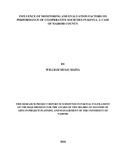Influence of Monitoring and Evaluation Factors on Performance of Co-operative Societies in Kenya. A Case of Nairobi County
Abstract
The study set out to examine the influence played by monitoring and evaluation (M&E) factors on performance of Co-operative societies in Nairobi County. The study examined how M&E factors, influenced Financial, Non-financial and Sustainability in performance deliverables, such as objectives of the Co-operative societies as well as achieving the right quality in line with the Co-operative society by-Laws. This study was guided by the following objectives: To determine how M&E Quality factors influences performance of Nairobi in Nairobi County: To examine the extent to which M&E Relational factors influences performance of Co-operatives: To assess how Organizational factors in M&E influence performance of Co-operative Societies in Nairobi County: To assess to what External Factors in M&E influence performance of Co-operative Societies Nairobi County. The study analyzed articles and previous papers on the subject of Monitoring and evaluation in the context of co-operative societies. The literature review discusses the context of the objectives and program theory selected as the theory that clearly explains and supports the thinking of the study. PERT diagram has been has been used as a model to explain monitoring as a factor that influences the performance of Co-operative society through activities. Two cases were discussed to give perspective to performance of Co-operative societies at the regional and international level. PERT diagram was used as a model to explain monitoring as a factor that influences the performance of Co-operative society through activities arranged. Lastly a conceptual framework was derived to give direction to the study. The research study adopted a correlational and descriptive design to assess whether M&E factors influences the performance of Co-operative societies. The study targeted the co-operative society managers of the Co-ops in Nairobi County who were directly involved in management, monitoring and evaluation of the societies. Due to the need to get specific information from specific people, purposive sampling was used to select the managers; however, a mix of stratified and random sampling was used to select the societies in order to get an objective view. The study collected data with questionnaires with open and close ended questions. Descriptive analysis of the data collected was mainly done in narrative form using descriptive statistics and Tables as appropriate. The results were assessed on whether they agree with other similar studies done previously. Collected data will be analyzed using SPSS. The study found that the different aspects of quality influenced the performance of co-operative society. Although quality was identified as a key component to utility, the process of M&E itself lacked quality. Relational issues were found to positively affect the performance although there were poor relations in most cases. Organizational structure and culture was found to be firm with the same contributing positively to performance. The co-op performance was not negatively affected by external factors with the media although highly regarded it changing members’ opinion, remaining a non-factor on performance. Finally the study recommended that more emphasis be given to the planning phase of M&E to ensure inclusivity and better structures within the Monitoring and evaluation units as well as the organizational structure of the Co-operative society to enhance resilience of M&E process.
Publisher
University Of Nairobi
Rights
Attribution-NonCommercial-NoDerivs 3.0 United StatesUsage Rights
http://creativecommons.org/licenses/by-nc-nd/3.0/us/Collections
The following license files are associated with this item:


